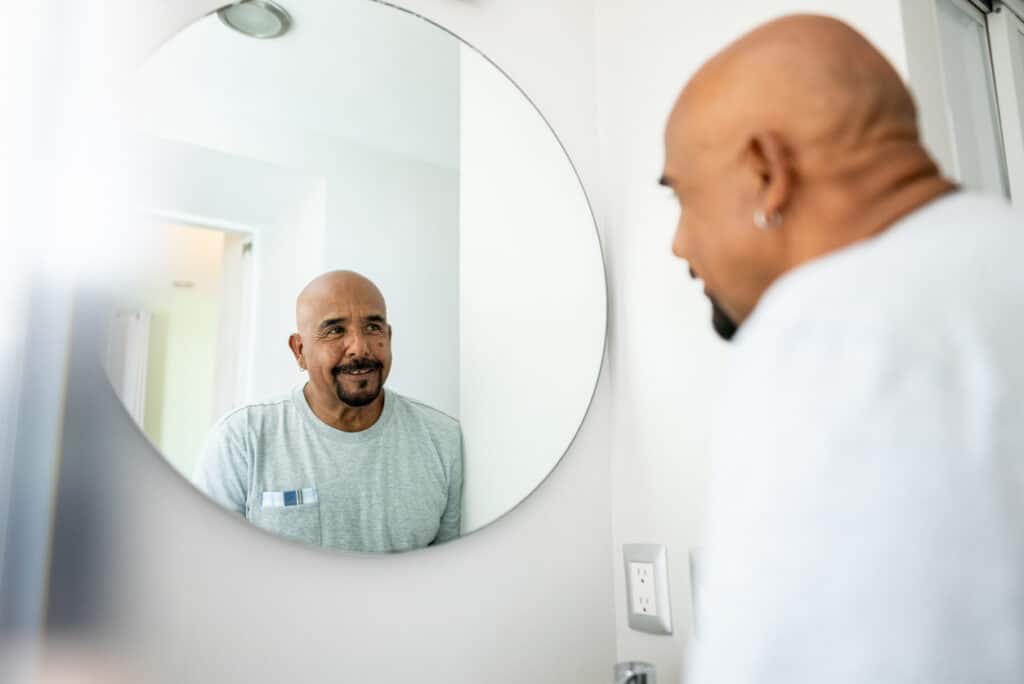Forgiveness holds immense power. If you’ve ever experienced being forgiven for a mistake that hurt someone, you likely understand how impactful it can be. Conversely, if you’ve been deeply wounded by someone, you know how challenging it can be to offer forgiveness. However, one of the most difficult yet necessary acts of forgiveness is learning to forgive yourself.
Self-forgiveness is a crucial element in the recovery journey. It enables you to let go of the guilt and shame that may hinder your progress and helps you adopt a healthier, more optimistic mindset. In this article, we will explain what self-forgiveness means in recovery and provide tips and activities to help you embrace it.
What Does Self-Forgiveness Mean in Recovery?
Self-forgiveness during recovery is the journey of releasing feelings of guilt, shame, and self-blame tied to past actions, enabling you to heal and progress.
This process doesn’t involve overlooking harmful actions or disregarding their consequences. It’s about recognizing your history, realizing you are more than your errors, and granting yourself the kindness to start anew.
Why Is Self-Forgiveness Critical in Recovery?
Practicing self-forgiveness is a vital aspect of recovery because it helps you escape the cycle of guilt and shame that can leave you feeling stuck. Clinging to past errors and continuing self-blame can obstruct your ability to make progress, establish healthy routines, and fully engage in your recovery journey.
When you lack self-forgiveness, you become more susceptible to reverting to self-doubt, increasing the likelihood of relapse. Shame won’t break this cycle; rather, it perpetuates it by inflicting feelings of worthlessness and convincing you that overcoming your addiction is unachievable.
How to Begin the Journey of Self-Forgiveness in Recovery

Although forgiving yourself is a crucial aspect of recovery, it can initially be challenging. Here are five steps to guide you in meaningfully practicing self-forgiveness:
1. Recognize Your Past Missteps
The initial step toward self-forgiveness is taking responsibility for your actions without evading or denying them. Acknowledging your past and understanding the ways your addiction has affected your loved ones may be uncomfortable, but it’s a vital part of healing. You don’t need to keep punishing yourself, but honesty with yourself is essential to facilitate movement forward.
2. Recognize That You Are More Than Your Mistakes
Your errors do not define who you are. In your recovery journey, it’s crucial to differentiate your identity from the behaviors you are trying to change. Recognizing that your past actions do not dictate your future is fundamental to letting go of self-blame.
3. Practice Being Kind to Yourself
Self-forgiveness begins with self-kindness. Showing yourself compassion means treating yourself with the same care and understanding you would offer a friend. Rather than dwelling on your failures, acknowledge that you are making an effort to right your wrongs.
4. Consider Seeking Professional Support
At times, the process of self-forgiveness can feel daunting to manage alone. Engaging with a therapist or joining support groups can provide helpful guidance and perspectives on how to healthily shed feelings of guilt and shame. A professional can assist you in working through any lingering emotions that may obstruct your path to self-forgiveness.
5. Make Amends When Possible
Taking steps to rectify past wrongs, when feasible, can significantly support your self-forgiveness journey. While making amends won’t erase the past, it demonstrates your commitment to alter your behavior and mend relationships affected by your addiction.
Activities to Foster Self-Forgiveness in Recovery

Now that we understand the importance of self-forgiveness in recovery, how can we practice it? Here are several activities designed to help you cultivate self-forgiveness and progress along your recovery path.
1. Journaling Your Thoughts
Journaling is an excellent way to process your emotions and reflect on your journey in recovery. It provides a space for you to contemplate your past actions, understand your feelings, and monitor your progress over time. This practice can help you differentiate who you are from previous actions, allowing you to recognize your development while letting go of guilt.
Instructions:
1. Dedicate 15-20 minutes daily to write in your journal.
2. Write about a past mistake that burdens you and your feelings surrounding it.
3. Consider the impact your actions had on others and how you’ve evolved since then.
4. Conclude your entry by reminding yourself that you are beyond your mistakes and that personal growth is part of the process.
2. Affirmations for Self-Kindness
Utilizing affirmations is a potent method for reshaping your mindset. Regularly expressing positive statements to yourself can help replace self-criticism with compassion.
This method allows you to embrace the belief that forgiveness and healing are within your reach, enhancing your confidence during your recovery journey.
Steps:
1. Every morning, stand in front of a mirror.
2. Take several deep breaths to calm yourself.
3. Repeat affirmations such as:
- “I deserve forgiveness.”
- “I am doing my best.”
- “I am growing and learning every day.”
4. Speak these affirmations with sincerity and allow them to resonate within you.
5. Use these affirmations throughout the day, particularly when negative thoughts try to intrude.
3. Mindfulness and Meditation

Practicing mindfulness and meditation is a wonderful way to cultivate a non-judgmental perception of yourself. These techniques help anchor you to the present and lessen the impact of negative thinking. They also foster greater self-awareness and compassion as you learn to release past errors.
Steps:
1. Dedicate 10-15 minutes each day for either meditation or mindfulness.
2. Select a quiet area where you won’t be interrupted.
3. Close your eyes and pay attention to your breathing.
4. Should negative thoughts surface, kindly acknowledge them and gently bring your focus back to your breath.
5. Remain in the moment, letting go of any judgment or guilt from the past.
4. Making an Amends List
Creating amends is about acknowledging your past behaviors and working towards mending relationships. Drafting an amends list is an effective way to consider those you may have hurt and how to take responsibility, even if it’s simply through a sincere apology. This is an impactful step on your journey to self-forgiveness.
Steps:
1. Take a brief moment to list individuals you’ve wronged or disappointed.
2. Against each name, note the actions that caused pain and how those individuals may have felt.
3. Contemplate how you can make amends—whether it’s an apology or offering help where you can.
4. Begin with those you feel prepared to contact, and outline a strategy for reaching out.
5. Honor Your Achievements
It’s common to concentrate on what remains unachieved, but celebrating even minor successes in recovery allows you to shift your focus to what you’ve already accomplished. Acknowledging progress motivates you to continue and emphasizes that recovery is about advancement rather than perfection.
Steps:
1. Allocate time each week to contemplate your successes, no matter how small they may seem.
2. Jot down at least three accomplishments from that week.
3. Take a moment to recognize and celebrate these victories—be it staying sober for a week, learning new coping strategies, or handling a challenging situation without resorting to substances.
4. Share your accomplishments with a supportive friend or family member to reinforce constructive changes.
6. Establishing a Forgiveness Ritual
Establishing a ritual for self-forgiveness can effectively help you let go of guilt and foster healing. This symbolic action enables you to alleviate the emotional burden of past mistakes and take steps toward peace and closure.
Steps:
1. Take a moment to think about the sense of release and tranquility you’ll feel afterward.
2. Choose a calm, private moment to perform this ritual without distractions.
3. Write down the things you need to forgive yourself for on a piece of paper.
4. Reflect briefly on each item, recognizing its impact without passing judgment on yourself.
5. When you’re ready, read the paper aloud, then safely burn or tear it as a physical representation of letting go.
6. While doing this, say aloud, “I forgive myself, and I choose to move forward.”
Seek Support for Sustainable Recovery
Self-forgiveness is an essential element of your recovery path. While it takes time, with the right support, healing and moving forward are achievable. At The Meadows, we are committed to assisting you at every step towards lasting recovery.
If you or someone you care about needs support in their recovery journey, or you have questions about taking the first step, we are here to assist.
Reach out to us today to find out more about our addiction recovery treatment programs.


